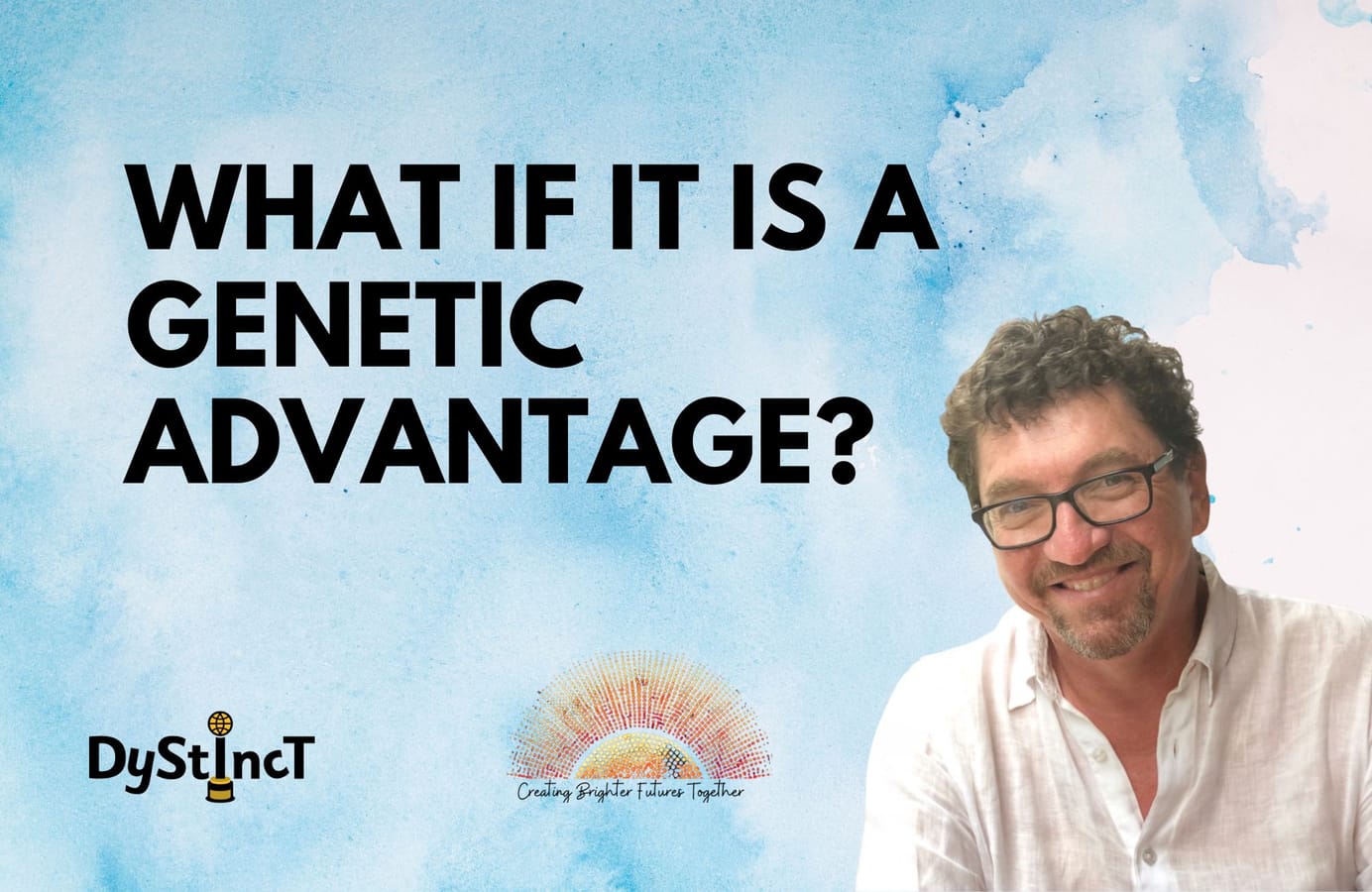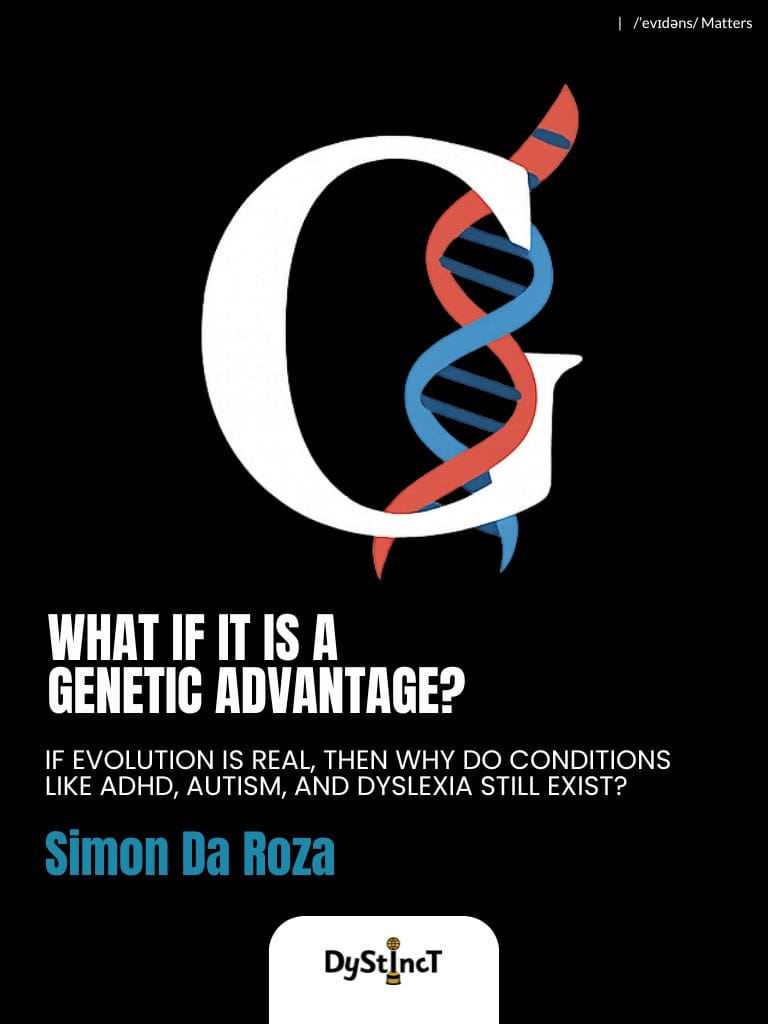
Issue 27: What if it is a genetic advantage? Simon da Roza
Simon da Roza challenges the deficit view of neurodivergence by reframing ADHD, autism, and dyslexia as valuable expressions of human diversity, arguing that modern education systems fail not because of these minds but because they were never designed for them.

Over the holidays, I found myself asking a question that wouldn’t let go. If evolution is real, and I believe it is, then why do conditions like ADHD, autism, and dyslexia still exist? If they were really as disadvantageous as some people make them out to be, wouldn't our genes have bred them out by now? Why would nature preserve something that doesn't serve us as a species?
That question didn't come from doubt. It came from curiosity. The kind of restless, pattern-seeking curiosity that my neurodivergent brain thrives on. It's the same drive that makes me lose time researching, connecting dots, following ideas all the way down the rabbit hole. Some call that hyperfocus. I call it being true to myself.
So, I went looking not just in research papers, but in books that gave me a broader view: The Fall of Civilisations, The Soul, and The Memory Gene. I didn't expect them to intersect. I didn't expect them to connect so personally. They helped me see that these so-called "disorders" (according to the medical lexicon) might not be disorders at all, but actually advantages! They might be deeply human traits preserved, not in error, but because they matter.
The so-called "disorders" (according to the medical lexicon) might not be disorders at all, but actually advantages!
From The Memory Gene, I learned that oral history stretches back over 500,000 years. That's how long humans have been telling stories, passing on knowledge through voice, image, rhythm and repetition. Writing, by contrast, has existed for only 5,000 years. Our brains aren't wired for print, they're wired for people. So, when a child struggles to decode a sentence but can explain the entire plot of a movie, mimic an accent, or remember everything about a subject that excites them, maybe that's not a failure of literacy. Perhaps it's an echo of something older. Something essential.
Perhaps what we call "oral learning" isn't primitive at all but the pinnacle of relational intelligence, memory, and trust.
I couldn't reflect on oral history without acknowledging the extraordinary culture of Aboriginal and Torres Strait Islander cultures. For over 65,000 (at least) years, the world's oldest continuous civilisation sustained complex systems of knowledge, law, medicine, navigation and ecology without writing a word. Knowledge was passed down through songlines, stories, ceremonies, and land-based memory. These oral traditions weren't simply cultural expressions. They were vital survival tools. Accuracy meant life or death. Storylines were embedded into the landscape itself, allowing knowledge to be passed with extraordinary precision across countless generations. In this way, Australia's First Nations people developed and preserved knowledge systems more enduring than any written civilisation on Earth. Perhaps what we call "oral learning" isn't primitive at all but the pinnacle of relational intelligence, memory, and trust.
It left me wondering what if the way children learned in those ancient systems holds wisdom for how we might teach today? Learning that was embodied, relational, and rhythmic. Learning grounded in land, community, and meaning. No standardised tests. No behavioural charts. Just a deep connection to story, to place, and to purpose. What if we paired that ancient knowing with enlightened pedagogy, one that understands neuroscience, honours difference, and trusts children's natural curiosity? Maybe then we'd begin to repair what's been lost. Not by going backwards, but by listening to the past long enough to shape a more human future.
That thought reshaped how I see the children I work with, and how I see myself. I see the ADHD kids who can't sit still in class but can plan an entire game level in their heads. The autistic teens who notice the tiniest shifts in energy or pattern that others miss. The dyslexic thinkers who struggle with spelling but instinctively grasp the big picture and tell it back in brilliant, layered detail. These kids aren't broken. They're operating with a different kind of operating system. One that's designed to adapt, notice, persist, and remember.
These kids aren't broken. They're operating with a different kind of operating system.
I started to think maybe ADHD is the trait that helped us scan for threats, or follow a trail, or come up with five different solutions when the first four failed. Maybe autism preserved the intense focus needed to track the stars or tend to an invention. Maybe dyslexia encoded a way of understanding the world through shape, feeling and story. These aren't mistakes. They're human variation at its finest.
However, none of that fits neatly into a classroom built for uniformity. And that's where we run into trouble. Our schooling systems were never built with differences in mind. All we need to do is look to the work and legacy of Sir Ken Robinson for insight into this. As I read The Fall of Civilisations, I saw a pattern that chilled me. As societies became more centralised and hierarchical, literacy became a dividing line, a means to sort, exclude, and control. Religious institutions and empires used it to create classes of those who knew and those who obeyed. Schooling followed suit. It wasn't designed for learning. It was designed for obedience.
This post is for paying subscribers only
SubscribeAlready have an account? Log in


